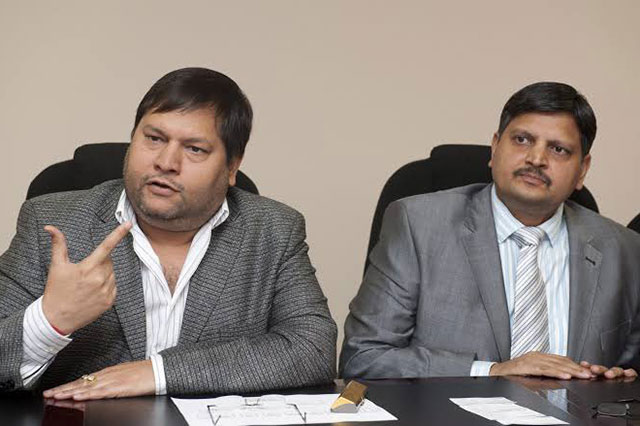Johannesburg – Two Indian-born businessmen brothers have been arrested in Dubai and face extradition to South Africa where they allegedly plundered state resources with the aid of ex-president Jacob Zuma.
A judiciary inquiry report into the corruption known as “state capture” concluded that the Guptas’ relationship with Zuma formed the nexus of state corruption.
Here are some facts and figures about the family.
Who are the Guptas?
The family is headed by Ajay, Atul and Rajesh (“Tony”) Gupta, three brothers from the northern Indian state of Uttar Pradesh.
Led by Atul, they arrived in South Africa in 1993 as white-minority apartheid rule crumbled, a year before Nelson Mandela won the country’s first democratic elections.
As the country opened up to foreign investment, the Guptas – previously small-scale businessmen in India – built a sprawling empire involved in computers, mining, media, technology and engineering.
The New Age, an ardently pro-Zuma newspaper, was launched in 2010, and the 24-hour news channel ANN7 took to the airwaves in 2013 with a similar editorial slant.
They had developed close links with the ruling African National Congress (ANC) party focusing particularly on Zuma, well before he became president in 2009.
Ties with Zuma
Zuma’s son Duduzane was a director of Gupta-owned Sahara Computers, named after their hometown of Saharanpur, and has been involved with several of the family’s other companies.
Former deputy finance minister Mcebisi Jonas claimed in March 2015 that the Guptas had offered him the post of finance minister, in return for obeying the family’s instructions — for which he would allegedly be paid 600 million rand ($39 million).
Backbench ANC lawmaker David van Rooyen was then revealed to have visited the Guptas’ home the night before his brief appointment as finance minister on December 9, 2015.
Tied in knots
Perhaps one of the most colourful Gupta-linked incidents related to a lavish family wedding in 2013.
Public anger erupted after it was revealed that a jet carrying more than 200 foreign guests to a Gupta wedding landed at Waterkloof Air Force base, outside Pretoria.
The airport is a military facility normally used for receiving heads of state.
It appeared that Zuma had tacitly approved the decision, which breached air force, customs and immigration rules. The guests were also accorded a police “blue light” escort.
What about their businesses?
The Gupta business empire was repeatedly accused of securing deals with South Africa’s giant state-owned companies on wildly favourable terms.
South Africa’s ethics watchdog, the Public Protector, published a damning report in October 2016, finding that the state-owned electricity monopoly had awarded a massive coal order to a Gupta-linked business at well above market prices.
On the watchdog’s recommendation, a judicial inquiry was opened, gathered testimonies for four years and is releasing serialised reports containing damning details.
“President Zuma readily opened the doors for the Guptas to go into the State-Owned Enterprises and help themselves to the money and assets of the people of South Africa,” concluded the inquiry.
Eskom ex-chairman Zola Tsotsi once told lawmakers how one of the Gupta brothers, Tony, summoned him to a meeting and threatened him with dismissal because he was not “helping” them.
“Tony told me… ‘you are not helping us with anything. We are the ones who put you in the position you are in. We are the ones who can take you out!'” he said.
Life after South Africa?
Since pressure began to mount on the Guptas, they fled South Africa to Dubai.
That same year Pretoria penned treaties to enable the two countries to help each other in the investigation and prosecution of crimes and the extradition of fugitives.
The extradition treaty was concluded in June 2021. The following month Interpol issued a red notice alert enabling law enforcement to arrest a person sought for prosecution or to serve a custodial sentence and hold them pending extradition.
Less than a year later the brothers are arrested.
Follow African Insider on Facebook, Twitter and Instagram
Source: AFP
Picture: Twitter/@musamathebulaa
For more Africa news, visit Africaninsider.com


